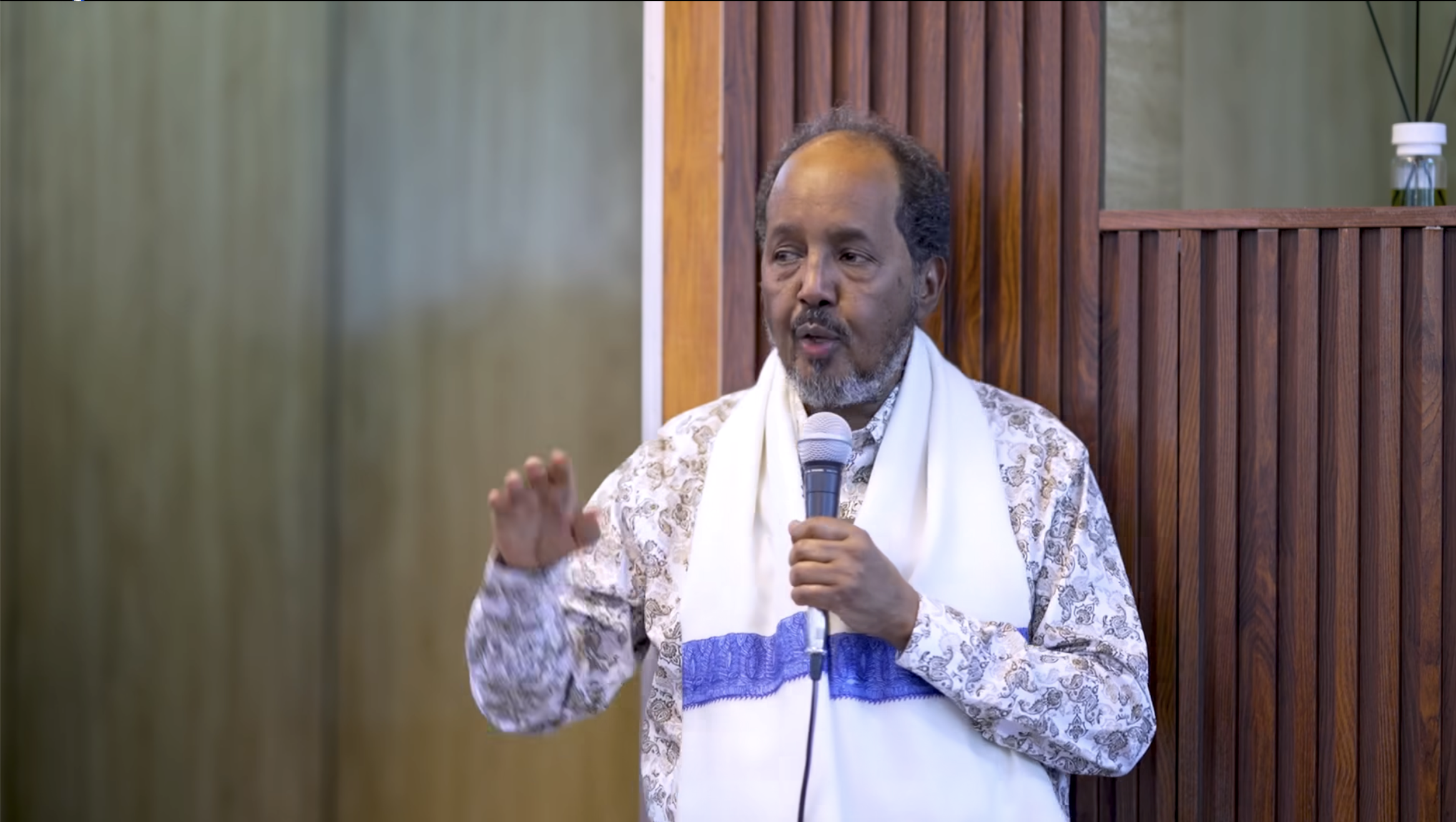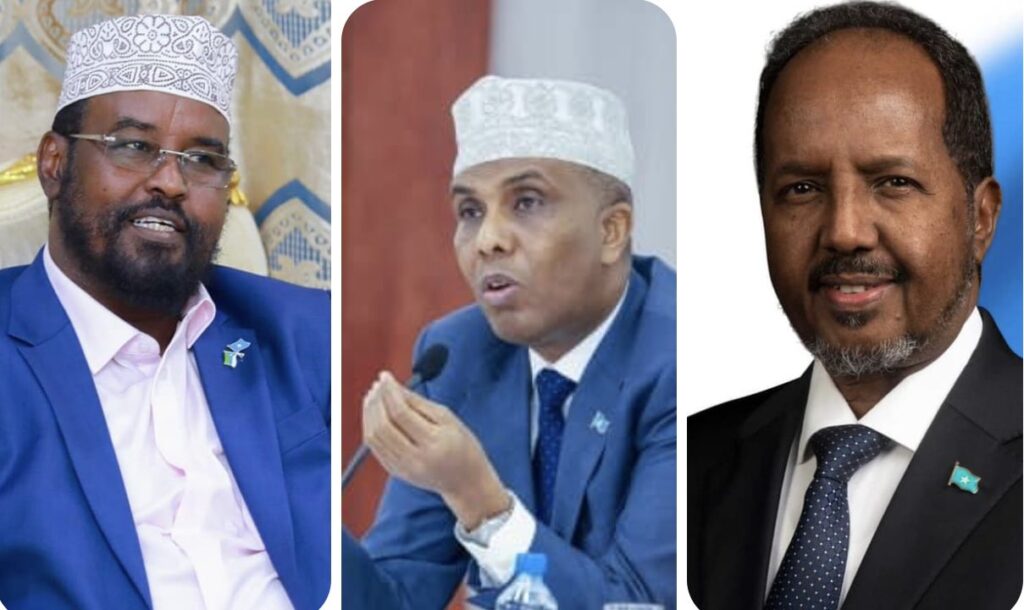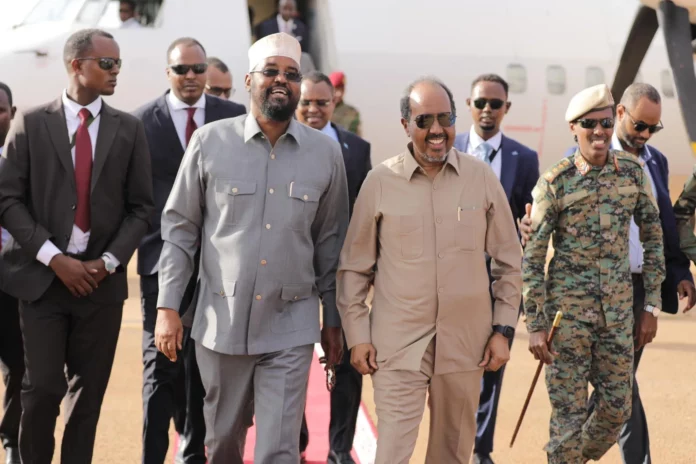MOGADISHU (Kaab TV) – Somalia’s president, Hassan Sheikh Mohamud, who is currently facing an arrest warrant, has launched a scathing attack on his political rival, Jubaland leader Ahmed Madobe, labeling him a “a former terrorist leader” attempting to sabotage the fight against Al-Shabaab for the interest of his ‘former friends’.
This is not the first time President Mohamud has used terrorism accusations against his opponents, a tactic that has become a last resort for Somali politicians in heated disputes.
The strained relationship between Mogadishu and Jubaland dates back years, rooted in political, territorial, and security disputes.
Jubaland, strategically located in southern Somalia and bordering Kenya, has been a key player in the fight against Al-Shabaab.
However, its semi-autonomous leadership under Ahmed Madobe has frequently clashed with Somalia’s federal government over issues such as the division of power, control of resources, and management of security operations.
Hassan Sheikh Mohamud and Ahmed Madobe, once political allies who managed to remove Mohamed Farmaajo from power in 2022, have now become fierce rivals, entangled in a high-stakes power struggle fueled by political disagreements and deep-rooted clan-based animosities.
Both have escalated their rivalry to new heights by issuing arrest warrants against each other last month, marking a bitter turn in their conflict.
Madobe, who has been the de facto leader of Jubaland since 2013, enjoys significant backing from Kenya and other regional players.
This external support, coupled with his firm stance against federal overreach, has made him a contentious figure in Mogadishu.
Successive Somali administrations have accused him of undermining national unity by resisting federal government directives and pursuing an independent agenda.
Meanwhile, Jubaland has often accused Mogadishu of attempting to meddle in its affairs, undermine its autonomy, and impose federal control, mainly under the Hawiye clan in Mogadishu.
These tensions have escalated in recent weeks, particularly regarding electoral processes.
The federal government has sought to centralize control over elections, but Jubaland has resisted, accusing Mogadishu of unilateralism and bias in selecting electoral commissions.
This impasse has heightened mistrust, as the federal government moved in to deploy armed forces to Jubaland further straining the already fragile federal-state relationship.

On Friday, while delivering a political speech at a mosque inside the presidential palace in Mogadishu—accessible only to a select group of government officials due to security concerns—President Mohamud strongly criticized Madobe.
He accused the Jubaland leader of derailing both his election plans and the ongoing offensive against Al-Shabaab.
“Ahmed Madobe not only skipped the NCC’s last meeting but has also refused to participate in the fight against Al-Shabaab. For all the operations, he kept weapons and ammunition in storage, only recently bringing them out,” Mohamud alleged.
The president went further, claiming he had jokingly remarked to Madobe during past interactions that the Jubaland leader was still colluding with his “former Al-Shabaab colleagues.”
Hassan Sheikh Mohamud also criticized Madobe for rejecting the federal government’s electoral plan, including its newly formed election commission, which remains controversial due to its perceived unilateral formation.
However, these remarks backfired, drawing attention to the fact that Somalia’s current Prime Minister, Hamza Abdi Barre, is a former ally of Madobe.
It was reportedly through Madobe’s influence and recommendation that Barre was appointed prime minister.

This raises questions about how President Mohamud could have endorsed a prime minister allegedly chosen by someone he now accuses of being associated with a terrorist group.
While the Jubaland administration has yet to respond to these accusations, Puntland’s Minister of Presidency, Abdifatah Abdinur, dismissed the allegations as absurd.
“Villa Somalia’s logic is narrowed to: you are the best if you are on my side, but you are a terrorist if you oppose me. At least stop playing politics in the mosque,” he said.
The ongoing conflict between Mogadishu and Jubaland reflects deeper challenges in Somalia’s federal system, where disputes over power-sharing, resource control, and regional autonomy continue to hinder political stability.
These divisions not only exacerbate tensions between federal and regional leaders but also undermine collective efforts to combat Al-Shabaab, a threat that looms over the entire Somalia.


